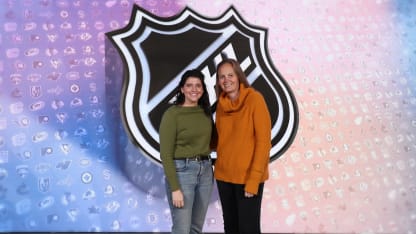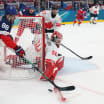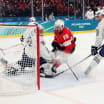But now, she needed a kidney donor again.
* * * *
It had never been a secret at the NHL, within her team, that Berran had kidney issues. She went for monthly infusions, she was not hesitant to talk about something that she hardly felt needed to be kept secret.
Which was how Curran Raclin, Berran’s supervisor and close friend and the NHL’s Senior Vice President, Fan Engagement, Analytics & Research, knew that eventually, she would get to this point.
Berran had put her name on the kidney donor waitlist a few years prior and had started receiving phone calls, none of them with matches good enough to consider. She reached out again to her family, but Raclin and Browning convinced her that the email couldn’t hurt.
“It’s a numbers game,” Raclin said. “We know that you’re going to be more likely to match to people in your family and she’s done this testing before, so she knew what she was working with. … Why not just play the odds?”
They let Browning know. It was time.
The ask came right before the weekly senior executive meeting with NHL Commissioner Gary Bettman, where Browning raised the issue. The response was immediate.
“The first thing Gary said is, ‘how is she doing?’ It was immediate concern for Aileen,” Browning said. “It was new information for all of us that a kidney doesn’t last forever when you have these transplants. Without hesitation, Gary said, ‘We’re a family, absolutely.’”
They wrote the note. They sent it off.
“I somehow knew it would yield some results,” Browning said. “I didn’t know it was going to yield a match but Aileen’s such a wonderful human. She interacts with everyone in the organization. She’s admired universally for both her commitment to work and doing really excellent work and awesome communication and awesome teamwork that I just felt like she’s the kind of person that anyone would give a kidney for.”
The reaction was stunning.
“The number of people who responded was extraordinary,” Browning said. “You really saw and felt the whole NHL family.”
No one is quite sure how many responses there were, but Berran estimates that there were between 17 and 20, including Raclin.
Weeks after the email went out, Berran, the Vice President, Fan Engagement and Data Strategy at the NHL, had colleagues coming up to her, apologizing that they were not matches. At least two asked if it would help if they started what is known as a chain reaction kidney donation, where they would donate to someone they did match with, potentially expanding the chances that Berran would end up with a kidney.
“They’re just great humans,” she said. “It was just really nice to see the best of people come out.”
Raclin was not surprised at the response. The rest of it?
“I think because people know her and they like her, I thought there would be a lot of engagement or people responding well,” Raclin said. “I honestly did not think that the donor would come from here. Just the odds of that seemed a stretch, but I’ve never been happier to be wrong in my whole life.”
* * * *
As Giustiniani sat at her desk reading the email, she figured that she would sign up, “Just to see,” as she put it.
“Did I think we were going to be a match?” said the 35-year-old Giustiniani. “No, of course not. But it was enough of a requirement just that I knew her and she was nice. And it seemed as simple as that. I just put my name down.”
One of the links contained in the email was a survey, asking whether the donation was a general one, for anyone who needed a kidney, or for a specific person. Giustiniani, who is a Finance Coordinator at the NHL, typed in Berran’s name, perhaps the first time she actually thought through the mechanics of what might happen, while still believing that the odds were far too long.
She answered the questions well enough that the hospital asked her to come in for bloodwork. She requested, instead, that she go to Quest Diagnostics, which was much more convenient. The test was sent to her apartment, but for a month it sat there, forgotten.
“I was like, I think I should probably do something about that,” she said, eventually.
She did the bloodwork on a Wednesday. On Friday, at 5 p.m., she got a phone call.
She was a perfect match.
“They [call on a Friday] on purpose so you can really marinate with it and make a decision,” said Giustiniani, who had not known she was blood type O-negative, making her a universal donor, before the testing. “I mean, the second I found out we were a match it was almost just like a lightbulb went off and it wasn’t really a question of yes or no.
“It just felt like, of course, why wouldn’t I do something like that?”
* * * *
When Giustiniani told Berran just after Thanksgiving that they were a match, Berran was a touch resistant, still believing that she would end up with a kidney from a family member. But after a few more conversations, she came around.
“[I] had another conversation with her and said, ‘are you really in on this?’” Berran said. “Because it’s huge. It’s a huge decision. We were not close. But listen, you’re younger, you’re healthy, I’m in. It’s a very enticing kidney.”
This was her person. This was her kidney.
That someone would do this for her?
“You can’t wrap your mind around it,” Berran said. “It’s just numbing.”
Neither wanted to wait long for the surgery, which they set for Jan. 28, 2025, arriving early for the approximately three-hour procedures. By 2 p.m., Berran headed to recovery, a piece of Giustiniani now a part of her.
They didn’t see each other until the following day, when part of Giustiniani’s physical therapy included her walking from her room to Berran’s, next door.
They laughed.
“She was eating,” Giustiniani said. “I had no appetite.”
Berran cuts in.
“Yeah, I was in much better shape than you were,” she said.
Berran, whose surgery included an incision and placement of the new kidney in her front left side, didn’t have much pain. But she did now have four kidneys. Because of the risks of removal and the invasiveness of the process, surgeons do not remove the kidneys that no longer work. So Berran has her original two in the back, the third on the right side, the fourth on the left, connected to the ureter.
Giustiniani left the hospital on Thursday, two days after the surgery. She headed over to tell Berran before heading home.
“The funniest thing is I’m getting ready to go say goodbye, she’s not even in her room, she’s out walking around,” Giustiniani said. “I can barely stand. She’s walking the halls. I didn’t even get to say goodbye.”
It was only in the days ahead, as they recovered from their surgeries and gained back their strength, that they stopped to ponder what had happened.
“Sometimes I’ll be just walking to work and I’ll think about it or remember what happened, because it happened two months ago but it feels like it happened a year ago, and I just get emotional thinking about the journey,” Giustiniani said. “It meant something to me. I know it meant something different for [Aileen], but it’s also upsetting because I don’t think this is talked about enough. I did not know the need for how many people are on that [United Network for Organ Sharing] list.
“Now that I see it from a different point of view, I have a different perspective. It’s something I did not put two seconds into my mind of every considering, that I wish it was discussed more, talked about more, just on people’s radar, because it was not on mine.”
It wasn’t. Until she got that email – and acted.
“The fact that two people have given me an organ is insane,” Berran said. “It’s still mind blowing to me. I call her a superhero.”
* * * *
Berran and Giustiniani don’t run into each other that often anymore, now that the NHL has moved to the new tower at One Manhattan West. They are not suddenly best friends, but there is so much warmth in their interactions, a form of love coloring their words.
They are tethered together, connected in the most literal sense.
“I think when we decided to do this I was like, I don’t have a good answer for why I did this,” Giustiniani said. “I don’t know how to explain it. But to me it just felt like, this is something that you should do.
“I had three surgeries in four years in my 20s, but I’m healthy. … I didn’t need somebody to do those surgeries. I could just go in and not think about it. It weighed on me that she had to rely on a complete other human being to feel healthy again and I can’t imagine what that feels like.”
For Berran, though, it remains a “for now” proposition, with the hope that this kidney -- young, well-matched, healthy -- will give her 15 or 20 years. Her creatinine levels are good, better than they ever were with her first transplanted kidney, so there is hope.
Even the upper limit, though, is not a lifetime, not for a 40-year-old who sees so much ahead of her. This will happen again. Berran will, almost certainly, need another kidney someday.
Though, as Giustiniani quips, “This better last a minimum of 20 years.”
She is well aware of the kindness she has already relied on, the sacrifice of the two people -- one related, one not -- who have given her life. She hopes this will bring greater understanding, of the need for kidneys, of the understanding of the gifts others are willing to give.
“I hope people see a recipient and a donor who are back at the office, generally able to live a life with not too much post-recovery disruption and realize actually this may be something that’s more common than you think, but also that is not something that you have to give up your whole livelihood if you want to help,” Raclin said.
Berran and Giustiniani are not alone, either. Their story marks at least the third time that the hockey world has connected a kidney donor to a kidney recipient.
In 2018, a Pittsburgh Penguins fan named Kelly Sowatsky brought a sign to a Penguins game, resulting in a social media post, leading to a Penguins fan named Jeff Lynd in Dover, Delaware, coming across the sign on the team’s app. They were a match.
In 2023, Aaron Portzline, a writer who covers the Columbus Blue Jackets for The Athletic, posted on X that he was in stage 5 kidney failure and in need of a kidney. Lindy Noel, who works in corporate communications for the Blue Jackets and knew Portzline tangentially, clicked on the link he supplied. They were a match.
“It is what NHL is all about, right?” Browning said. “We always take care of our own, whether you’re on the ice or off the ice, we take care of our own people and family first. … That’s what it means to be part of the family and the fanbase.”
It’s not just hockey, of course. There are 105,125 people who need an organ transplant, according to UNOS. There are 58,737 people that are active waiting list candidates, some of whom can wait years to receive the organ that they desperately need, some of whom don’t make it until their name comes up on the list.
“There’s a lot of people in need,” Berran said. “Dialysis is not fun. … People have to do this for years at a time.”
At one point, Berran was getting a new driver’s license, and the person next to her was asked whether they wanted to become an organ donor. They were talking to themselves, considering, when Berran leaned over.
She told them she had received a kidney. The person signed up.
“Just have an open mind,” Giustiniani said. “I never considered doing something like this before, but when I found out I had the ability to do it, it just changed everything. … Yes, it was hard, but I look back on it and I don’t regret it for a second.”
Giustiniani is asked what she sees when she looks at Berran. She glances over, laughs.
“Myself,” she quips.
She finds it uncomfortable to pat herself on the back, to see herself the way Berran looks at her, knowing that she made a decision and it helped change the course of someone else's life.
For Berran’s part, she can only give her thanks, which seems both exactly right and not nearly enough.
“I don’t think there’s anything I could do,” Berran said. “You literally gave me life.”


















